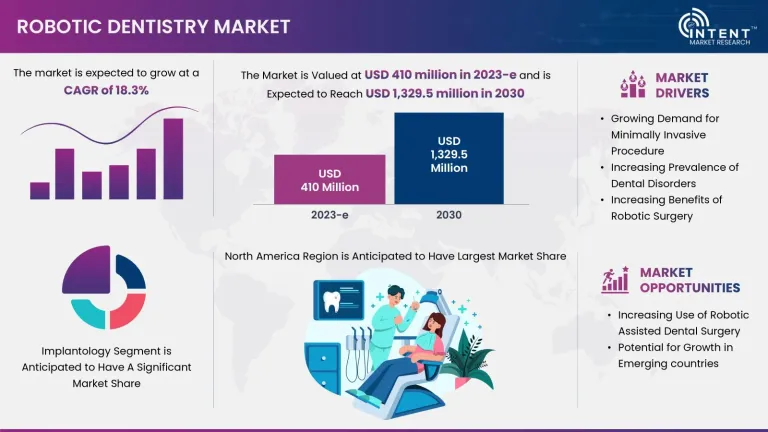The robotic dentistry market is undergoing rapid transformation, driven by advancements in automation, artificial intelligence, and precision tools. This innovative field focuses on enhancing patient outcomes, increasing procedural accuracy, and reducing clinician workload. As of 2023, the market is valued at approximately USD 410 million and is projected to grow at an impressive CAGR of 18.3%, reaching a market size of USD 1,329.5 million by 2030. The shift towards automated dental solutions underscores a significant evolution in healthcare, offering immense growth potential.
The Rise of Robotic-Assisted Dental Procedures
Dental robots are revolutionizing practices by offering enhanced accuracy in procedures like implant placement and root canals. Traditional methods often rely on a manual approach, which, while effective, carries a higher likelihood of human error. Robotic systems, guided by preoperative imaging and AI-driven algorithms, provide unparalleled precision, ensuring better long-term results for patients.
Download Sample Report @ https://intentmarketresearch.com/request-sample/robotic-dentistry-market-3073.html
Market Dynamics Driving Growth
Technological Advancements
Robotics technology in dentistry has seen innovations such as automated surgical robots and AI-guided imaging tools. These developments help in complex diagnostics and treatments, significantly improving procedural success rates.Growing Dental Disorders
With the global rise in dental issues, such as periodontitis and tooth decay, there's an increased demand for advanced solutions. Robotic dentistry offers minimally invasive methods to address these concerns.Increasing Adoption in Clinics
Dental professionals and clinics are increasingly adopting robotic systems to reduce fatigue and improve efficiency. Enhanced patient comfort and shorter recovery times also contribute to growing adoption.
Applications in the Robotic Dentistry Market
Implantology
Robotics is making dental implants safer and more precise by providing surgeons with enhanced tools for planning and execution. These systems ensure implants are placed in the optimal position, reducing post-surgery complications.Orthodontics
AI-powered robots help orthodontists design and manufacture clear aligners, reducing production times while improving accuracy. This innovation leads to better patient satisfaction and quicker results.Endodontics
Automation in endodontics, such as root canal procedures, minimizes manual error and optimizes treatment precision, making it an integral part of the market growth.
Challenges in the Adoption of Robotic Dentistry
High Initial Costs
Setting up robotic systems in dental practices involves significant investment. While these costs are offset by efficiency and better outcomes, they can pose a barrier for smaller clinics.Technical Expertise
Dental professionals require extensive training to operate robotic systems. Bridging the skills gap remains a priority for market stakeholders.
Access Full Report @ https://intentmarketresearch.com/latest-reports/robotic-dentistry-market-3073.html
Regional Analysis of Market Growth
North America
As a hub of technological innovation, North America dominates the robotic dentistry market. Supportive healthcare policies and significant investments in dental technology fuel this growth.Europe
With its focus on healthcare advancements, Europe is witnessing increased adoption of robotic dentistry. Countries like Germany and the UK are leading the way.Asia-Pacific
Emerging economies in the Asia-Pacific region are rapidly embracing robotic dental solutions, driven by improving healthcare infrastructure and growing awareness.
The Future of Robotic Dentistry
The potential for innovation in robotic dentistry is immense. Integration with AI, IoT, and augmented reality could take diagnostics and treatment to unprecedented levels. Research efforts are also focused on developing more affordable and accessible robotic systems.
**
**
FAQs
What is robotic dentistry?
Robotic dentistry refers to the use of advanced robotic systems and AI technologies to perform dental procedures with precision and minimal invasiveness.What are the main applications of robotic systems in dentistry?
Applications include implantology, orthodontics, and endodontics, where accuracy and efficiency are critical.Which regions are leading the growth of robotic dentistry?
North America, Europe, and Asia-Pacific are the frontrunners, each contributing significantly to market expansion.What challenges does the market face?
High costs and the need for specialized training are among the primary challenges in the adoption of robotic dentistry.How will robotic dentistry evolve by 2030?
Integration with advanced technologies like AI and IoT will likely lead to more affordable and efficient robotic systems, driving broader adoption across the globe.
About Us
Intent Market Research (IMR) is dedicated to delivering distinctive market insights, focusing on the sustainable and inclusive growth of our clients. We provide in-depth market research reports and consulting services, empowering businesses to make informed, data-driven decisions.
Our market intelligence reports are grounded in factual and relevant insights across various industries, including chemicals & materials, healthcare, food & beverage, automotive & transportation, energy & power, packaging, industrial equipment, building & construction, aerospace & defense, and semiconductor & electronics, among others.
We adopt a highly collaborative approach, partnering closely with clients to drive transformative changes that benefit all stakeholders. With a strong commitment to innovation, we aim to help businesses expand, build sustainable advantages, and create meaningful, positive impacts.
Contact Us
US: +1 463-583-2713
